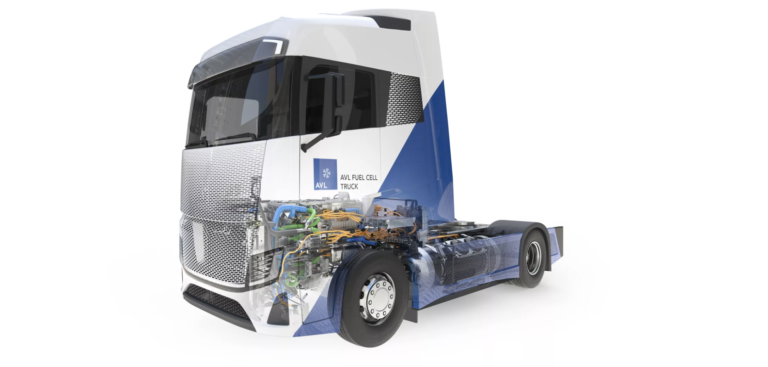Hydrogen is set to play a crucial role in advancing sustainable mobility, with particular benefits for commercial vehicles, given their demanding performance requirements. To enhance confidence in fuel cell technology, AVL and Spark EV Technology have collaborated to develop an intelligent energy management system tailored for commercial vehicles.
Using patented control algorithms and innovative software capable of predicting energy requirements, the system enables the pre-planning of routes through a digital map provider, promoting energy- and cost-efficiency. The partners employ a virtual truck (digital twin) to simulate a journey and illustrate how route characteristics, altitude profile, driving behavior and factors like load or traffic volume determine the energy requirement per kilometer. Spark EV Technology’s machine learning-driven energy-prediction software ensures increasingly accurate predictions, optimizing fuel cell operation and reducing energy consumption.
The primary goal of this collaboration is to empower fleets to operate efficiently and environmentally responsibly. The technology advises on when it’s advisable to draw energy from the battery to alleviate the load on the fuel cell. In instances of high power demand or insufficient battery charge, the fuel cell is activated. The strategy not only reduces hydrogen consumption but also allows for adaptable and minimized battery sizes.
Gentle operation extends the service life of costly components, ultimately reducing maintenance costs. Fleet operators can leverage this technology in the preliminary planning of their drive systems, demonstrating the profitability of integrating fuel cell trucks into their fleets.
Justin Ott, CEO of Spark EV Technology, said, “Hydrogen will play a critical role in the energy mix for commercial vehicles. Our plan is to provide a solution that optimizes FCEV performance and removes range and refueling anxiety by providing confidence in highly accurate, up-to-date range availability and optimizing hydrogen fuel consumption to enable more fleets to make the switch faster and provide manufacturers with a realistic FCEV option.”
Dominik Brunner, lead engineer of integration and validation at AVL, added, “By choosing the right energy source at the right point of the journey, the solution reduces energy consumption and is therefore an important step toward sustainable and more cost-effective transportation. We look forward to seeing what comes out of the partnership with Spark EV Technology and exploring how we can help more manufacturers make the transition to zero-emission vehicles.”
For more on fuel cell technologies, please click here.


